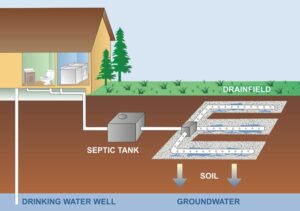What’s a drain field?
Ever wonder what a drain field is? It’s definitely not a tropical paradise. A drain field is an underground area where wastewater slowly seeps through sand and gravel into the ground where it can be treated by naturally found bacteria. Drain fields are used on properties with septic systems to help dispose of wastewater more efficiently and cleanly.
Is a drain field important?
The Drain Field is the most important part of your septic system. Without it, all that water and waste would go straight into the ground instead of filtered through soil. A drain field’s job is to filter out solid from liquid waste before it enters the groundwater or nearby streams. Therefore, there is no harm done to the environment.
One of the primary reasons environmentally conscious homeowners choose to use septic systems instead of sewer lines or city water lines is because the underground ecosystem is not exposed to dangerous chemicals or waste.
Once filtered waste enters the soil, it is then strained by two types of aerobic bacteria: Nitrosomonas and Nitrobacter. The bacteria breaks down organic materials such as grease and oil with oxygen gas to produce nitrates for plants. We need nitrogen gas in order to naturally fertilize our homes lawns and gardens.
So now you can see just why the drain field is such an essential component to your septic system. Moreover how important it is to protecting your home and lawn from unsafe or hazardous chemicals.

Steps To Take!
Maxx’s Products Septic Treatments are formulated with over one billion natural enzymes that help liquify the tank and open perforated holes in the drain field to ensure your septic system keeps running smooth. Click HERE to order our Maxx’s Products Septic Maintenance Treatment effective all the way to your drain field, leach, and lateral lines
Check out these links and other Maxx’s Products Blog Posts for tips and tricks on your home maintenance care!
Septic Owner Garbage Disposal Hacks
Just have your septic tank pumped?
Safe Plants & Trees To Grow With A Septic Tanks
How To Ensure Your Septic System Is Summer Ready
